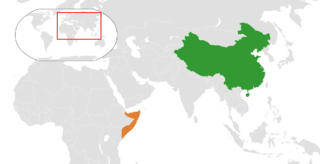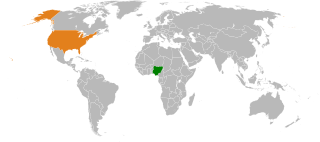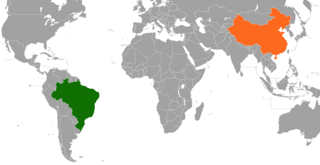
India, officially the Republic of India, has full diplomatic relations with 201 states, including Palestine, the Holy See, and Niue. The Ministry of External Affairs (MEA) is the government agency responsible for the conduct of foreign relations of India. With the world's third largest military expenditure, second largest armed force, fifth largest economy by GDP nominal rates and third largest economy in terms of purchasing power parity, India is a prominent regional power and a rising superpower.

Since independence, with Jaja Wachuku as the first Minister for Foreign Affairs and Commonwealth Relations, later called External Affairs, Nigerian foreign policy has been characterised by a focus on Africa as a regional power and by attachment to several fundamental principles: African unity and independence; capability to exercise hegemonic influence in the region: peaceful settlement of disputes; non-alignment and non-intentional interference in the internal affairs of other nations; and regional economic cooperation and development. In carrying out these principles, Nigeria participates in the African Union, the Economic Community of West African States (ECOWAS), the Non-Aligned Movement, the Commonwealth of Nations, and the United Nations.

China–Somalia relations are the bilateral relations between China and Somalia. Somalia maintains an embassy in Beijing. China has an embassy in Mogadishu. It is led by Ambassador Wei Hongtian.

China–Kenya relations refer to the bilateral relations between the People's Republic of China and Kenya. The two countries established relations in 1963, suspended ties temporarily in 1967, but ultimately re-established diplomatic relations in 1978. Since then, they have significantly expanded their economic and investment agreements, such that China is currently Kenya's largest trading partner. While the robust trade, investment, and Chinese-led infrastructure projects have benefitted Kenya's overall development and have been labelled by both governments as "win-win" collaborations, local media and foreign analysts have increasingly criticized both the potential consequences of Kenya's loans from China as well as Kenya's overall economic dependence on foreign capital and products. The most ambitious collaboration, the Standard Gauge Rail that was planned to connect Nairobi, Kenya, Uganda, South Sudan, and Rwanda using Chinese financing and contractors, has attracted even more controversy due to financial complications, questions on the legality of its tinder process, and the alleged collateralization of Kenya's Mombasa port.

Bilateral relations between the Federal Republic of Nigeria and the United States of America were formally inaugurated when Nigeria attained its independence from Britain in 1960. In the 21st century, they have entailed an important, if occasionally uneasy, alliance, following a more chequered diplomatic past. Nigeria has traditionally been among the United States's most important partners in Africa, and together the countries' populations account for more than half a billion people.

India–Vietnam relations, also knows as Indian-Vietnamese relations, are the bilateral relations of India and Vietnam.

The Republic of India and the Federal Republic of Nigeria have built strategic and commercial ties. Both are members of the Commonwealth of Nations and the Non-Aligned Movement. India has a High Commission in Abuja and a Consulate in Lagos, and Nigeria has a High Commission in New Delhi. Indian business firms have invested estimated $15 billion in Nigeria. India is Nigeria's leading investor, with a investment base of about $20 billion. The figures on the amount of Nigeria's investment in India if any are not known.

Greece–Nigeria relations are the bilateral relations between Greece and Nigeria. Nigeria has an embassy in Athens. Greece established a diplomatic mission in Nigeria in 1970, and today has an embassy in Abuja and a consulate in Lagos. Trade between the two countries is imbalanced, with imports from Greece to Nigeria exceeding exports. Greek-owned tankers have an important role in shipping Nigerian oil and natural gas, its main exports. Recently a Greek tanker was involved a dispute over crude oil smuggling. Greek-controlled companies have invested US$5 billion in the Nigerian economy. There is a small Greek business community in Lagos.

China–Saudi Arabia relations refers to the current and historical bilateral relationship between the People's Republic of China (PRC) and the Kingdom of Saudi Arabia.

Israel–Nigeria relations refers to the bilateral relations between the states of Israel and Nigeria. The Nigerian ambassador to Israel is David Oladipo Obasa. Nigerian government in collaboration with the Israeli government to bring Science, technology and innovation (STI) to the teeming youths of Nigeria in other to reduce the rate of unemployment amongst youth in Nigeria.

Brazil–China relations refers to the current and historical relationship between Brazil and China. Relations between Brazil and China began in the early nineteenth century and continued until 1949, when they were disrupted by the creation of the People's Republic of China (PRC). Diplomatic relations between the PRC and Brazil officially began in 1974 with agreement on the establishment and operation of Brazil's embassy in Beijing and China's embassy in Brasília. Since then, bilateral ties have developed mostly based on non-interference, equality, and mutual benefit (win-win).

People's Republic of China–Ethiopia relations were established in 1970. Ethiopia has an embassy in Beijing and the People's Republic of China has an embassy in Addis Ababa. Relations are longstanding, with Chinese direct investment (FDI) in Ethiopia reaching US$4 billion and bilateral trade growing to $5.4 billion by 2016-2018.

China–Venezuela relations are the international relations between the People's Republic of China and the Bolivarian Republic of Venezuela. Formal diplomatic relations between both countries were established in August 1944 and switched recognition to the PRC in 1974. Before 1999 only one sitting president, Luis Herrera Campins, had visited China. Cooperation began growing significantly during the Presidency of Hugo Chávez of the Bolivarian Republic of Venezuela and the tenure of Jiang Zemin and Hu Jintao as the leader of the People's Republic of China. China-Venezuelan trade was less than $500m per year before 1999, and reached $7.5bn in 2009, making China Venezuela's second-largest trade partner, and Venezuela is China's biggest investment destination in Latin America. Various bilateral deals have seen China invest billions in Venezuela, and Venezuela increase exports of oil and other resources to China. In 2016, China-Venezuelan trade amounted to $7.42 billion, with $4.9 billion coming from Venezuelan exports and $2.52 billion coming from Chinese exports.

Angola–India relations refers to the international relations that exist between Angola and India.

Indonesia and Nigeria established diplomatic relations 1965. Both countries are members of multilateral organizations such as the Non-Aligned Movement, World Trade Organization (WTO), Organisation of Islamic Cooperation (OIC) and Developing 8 Countries. Indonesia has an embassy in Abuja and Nigeria has an embassy in Jakarta.

Mexico-Nigeria relations are the diplomatic relations between Mexico and Nigeria. Both nations are members of the Group of 15, Group of 24 and the United Nations.

Chad–India relations refers to the bilateral relations between Chad and India. The High Commission of India in Abuja, Nigeria is concurrently accredited to Chad. India also maintains an Honorary Consulate in N'Djamena. In 2019, Chad opened a resident embassy in New Delhi.

Nigeria–Spain relations are the bilateral and diplomatic relations between these two countries. Nigeria has an embassy in Madrid. Spain has an embassy in Abuja and a consulate-general in Lagos.

Japan–Nigeria relations are the bilateral relations between Japan and Nigeria. The State of Japan has an embassy in Abuja and the Federal Republic of Nigeria has an embassy in Tokyo.

Germany-Nigeria relations are the bilateral relations between the Federal Republic of Germany and Federal Republic of Nigeria. Nigeria operates a Embassy in Berlin and Germany operates a Embassy in Abuja. Germany has a Consulate-General in Lagos and Nigeria has a Consulate-General in Frankfurt.






















